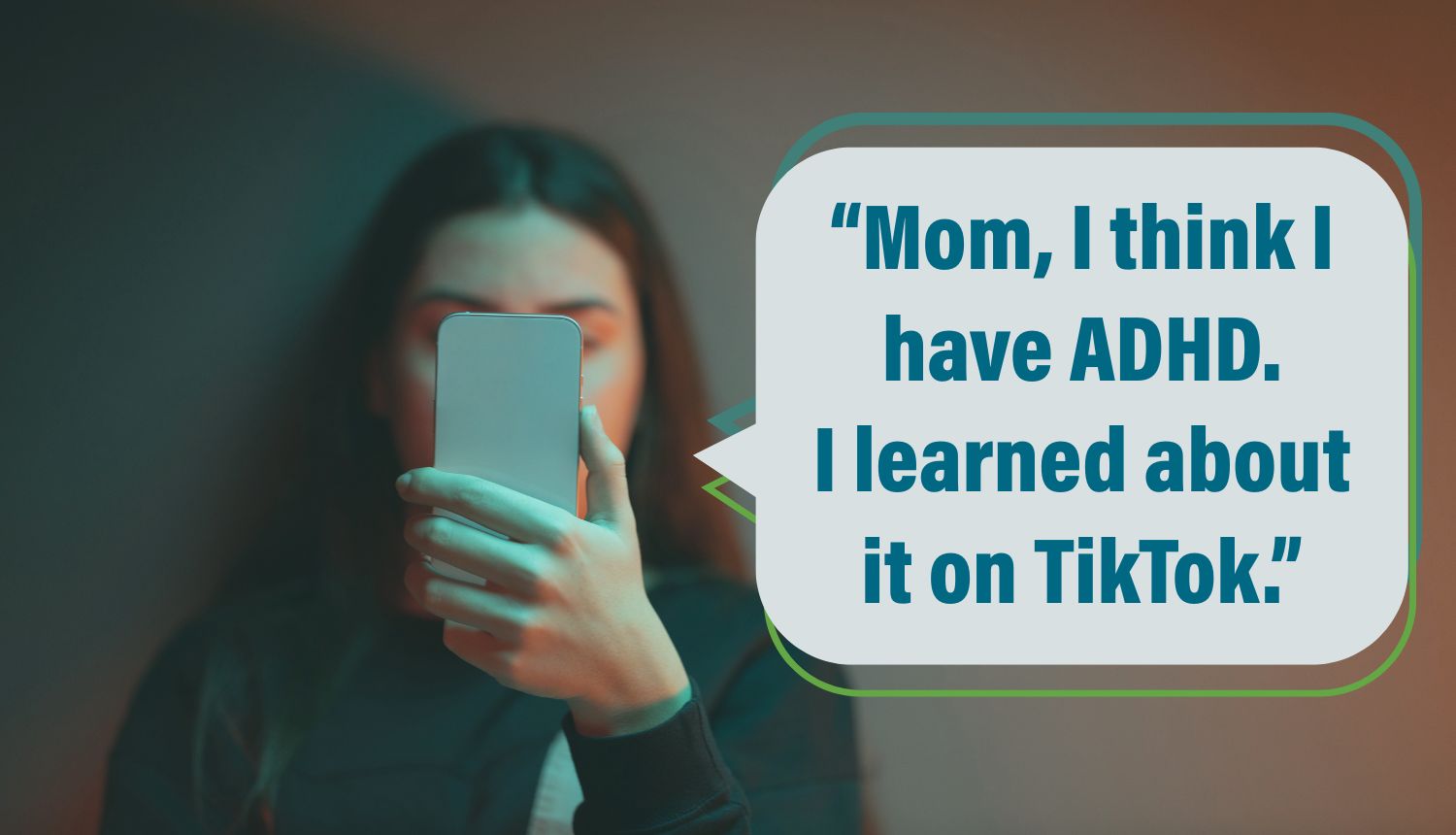TikTok is such a divisive topic nowadays—especially for teenagers.
When parents bring it up, they likely have a list of reasons for why it should be banned—or at least for why their child should cut back on his or her usage of the social media app. But for teens, TikTok can feel like a lifeline. It can help them stay on top of trends, discover new interests and even … diagnose mental health conditions?
That’s right. Increasingly since the pandemic, teenagers watching videos about ADHD, anxiety, depression and more have been self-diagnosing themselves with these mental health conditions.
Mostly, these teens are looking for answers, support and community. They want to understand how their brains are wired. They want to be affirmed in that wiring. And they want to know they aren’t the only ones.
But new research suggests that self-diagnosis isn’t the answer. In fact, it can even be detrimental.
Why Are Teens Self-Diagnosing?
In a recent study published in Educational Psychology in Practice, researchers define “self-diagnosis” as “identifying with a medical diagnosis, that is, a mental health condition, illness or neurodevelopmental difference, without the formal confirmation of a healthcare professional.”
The reasons a person may self-diagnose vary. It’s not as simple as “naivety or attention-seeking” the article states. In some cases, a young person may self-diagnose because for one reason or another, he or she doesn’t have access to professional mental health care.
But the authors of the paper suggest that for teens especially, there are social psychological reasons to consider as well.
During adolescence, we search for a sense of identity and belonging. We often value the opinions of our peers over those of adults. And we have a tendency to self-label. So when teens see a growing neurodiversity movement on social media and a “corresponding cultural shift,” it’s easy to get caught up in the fray. They want to have a condition to list, a box to check—however fringe it may be—so that they’ll belong. Even a seemingly negative mental health issue can be, paradoxically, seen as a badge of honor or identity.
Unfortunately, TikTok’s algorithm—which curates content based on what the user has previously engaged with—has a bit of “an echo chamber effect, which reinforces [the user’s] existing beliefs,” the study said. So if your child uses TikTok to research autism, for instance, then the algorithm will continue showing them content about autism. And this could potentially increase the chance that he or she will become convinced they have the condition.
But therein lies the problem with self-diagnosis.
Why Is Self-Diagnosis Problematic?
With enough time—which isn’t difficult to accumulate, since teens spend an average of two hours on TikTok daily—your child could develop psychosomatic symptoms related to a particular mental health disorder, furthering his or her belief that they have a condition.
In 2021, there was an increase in Tourette’s Syndrome-like symptoms among tween and teen girls due to the popularity of content about the condition on TikTok. And earlier this year, researchers discovered in increase in the “nocebo effect” (wherein someone experiences the negative health symptoms of a disease, even though they aren’t sick) due to the proliferation of health content on social media.
Unfortunately, those types of symptoms—whether real or imagined—do not a diagnosis make. For that matter, even real symptoms do not necessarily equate to having a condition.
In a study about the perception of attention deficit/hyperactivity disorder in relation to ADHD content on TikTok, researchers found that many of the symptoms described weren’t exclusive to people with ADHD. “Some of the things they were describing wouldn’t apply to all people with ADHD or also could apply to people without ADHD,” Vasileia Karasavva, the author of the study, told NPR.
Moreover, the study also found that much of TikTok’s ADHD content was misleading or even false. And “those who watched more of this content were more likely to recommend these videos, regardless of their accuracy.”
The prevalence of the content also impacted the perceived prevalence of the condition: Study participants who watched the ADHD TikTok content, estimated the prevalence of ADHD to be at nearly 30%. “In reality, it’s roughly 5% in Canada and 6% in the U.S.”
Obviously, this creates a problem with self-diagnosis, since many impressionable teens may be led to believe they have a condition based on incorrect information. But it also creates a problem for people who may actually have a mental health disorder.
When a condition is “overdiagnosed” (especially through self-diagnosis), it can make it more difficult for people who actually need help and support to receive it. It gives the impression of hypochondria or exaggeration of symptoms. It creates a stigma.
And for someone who really is struggling, that sort of dismissal can be devastating.
How Can Parents Help with Mental Health Diagnoses?
“Mom, Dad, I think I have [insert mental health condition]. I learned about it on TikTok.”
If you’ve heard those words or some variation, don’t immediately dismiss them. While I’ve spent a lot of time in this article highlighting how a TikTok-inspired self-diagnosis can be problematic, your child really could have some serious mental health concerns.
Although studies have found TikTok to be a culprit in self-diagnosis, they have also found that the social media giant can be a springboard for professional treatment. Many people who initially learn about mental health conditions through the platform have subsequently sought professional medical advice.
However, teenagers might be resistant to professional treatment for fear of being “disconfirmed.” If your child is searching for a sense of identity or belonging, then being told that a condition isn’t part of his or her identity, being told that he or she doesn’t belong, can be distressing. And if your teen has already labeled him- or herself with the condition on social media—or even just shared the self-diagnosis with friends or family—there could be social repercussions, too.
So perhaps even before you seek a professional diagnosis, it would be a good idea to sit down with your son or daughter to discuss their concerns. Reassure them that their health is your main priority. Let them know that their concerns are valid, even if they don’t receive an official diagnosis.
We all have our own unique challenges, after all. Be open to helping your teen manage any symptoms they may have. Make sure they understand that you’ll be there to help them find solutions when things feel overwhelming. And remind them that even if they’re “disconfirmed,” they can still sympathize with and support people who do have a mental health condition.


![14th May: Fred and Rose West: A British Horror Story (2025), Limited Series [TV-MA] (6/10)](https://occ-0-7324-1007.1.nflxso.net/dnm/api/v6/Qs00mKCpRvrkl3HZAN5KwEL1kpE/AAAABQ1EMYqh86uHZmNe7VzC2XFlvOCnKximSgaElMeLVr8lM0t1ncb478Rrrf36U5ECbNv5MNDllxMXz_UOyv5QIfITd5KB7-0OWsndUzkhK3hTE1_mjVVLQWMdwiDg3BJfEpkUGjgT8Z9wMh98kAhSQb4CfJG7qZN7MR9pIFW-G3t4m2I0CA4PhsYDKwO8q05m6Ew7Y1jpMg.jpg?r=602)












